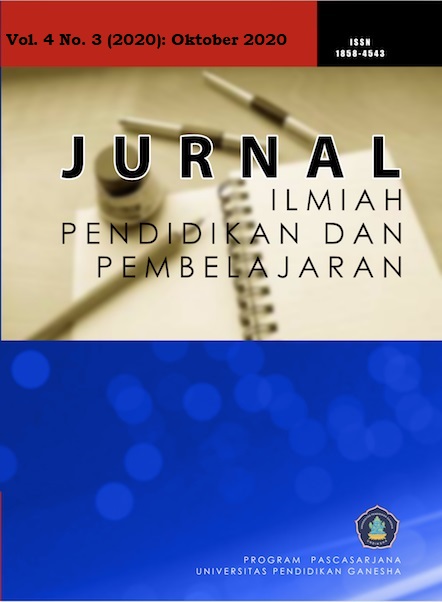Teacher’s Strategies in Promoting The 21st Century Learning Skills on Online Class in Tourism Vocational High School
DOI:
https://doi.org/10.23887/jipp.v4i3.28037Keywords:
Learning skills, 21st century, tourism, online classAbstract
This study aimed to analyze the strategies of promoting 21st century learning skills used by English teachers on online class in tourism vocational high school. The strategies in promoting 21st century learning skills used by the English teachers were described using qualitative descriptive research design. The instruments used by teacher to collect the data were observation sheet to use for observing the strategies appeared during the online class activities; and interview guide to know the perspective of the English teacher about the supporting and the challenging factors in using the strategies. The findings showed that from 9 strategies, 7 of them are used by the teachers. The most used strategy is the first strategy: using relevant material and topic. On the other hand, the seventh strategy: Enhancing teamwork as the outcome is not used by all the subjects of this research. The reason which is told by most of the teachers is because of the difficulty they faced in conducting teamwork project during online class effectively due to the recent issue. From 9 strategies, using relevant material and exploiting technology into class activities are the most used by the teachers among others. And from Nine strategies provided, 8 strategies used by the English teachers. The only strategy which is not used is the seventh strategy: Teamwork as the outcome. The teachers stated that creating group work based activities through online is not easy.
References
Boholano, H. (2017). Smart social networking: 21st century teaching and learning skills. Research in Pedagogy, 7(1), 21-29. http://scindeks.ceon.rs/article.aspx?artid=2217-73371701021B
Budsankom, P., Sawangboon, T., & Damrongpanit, S. (2015). Factors affecting higher order thinking skills of students : A meta-analytic structural equation modeling study, 10(19), 2639–2652. https://doi.org/10.5897/ERR2015.
Collins, R. (2014). Skills for the 21st Century: teaching higher-order thinking. Curriculum & Leadership Journal, 12(14). http://www.curriculum.edu.au/leader/teaching_higher_order_thinking,37431.html?issueI
Darling-Hammond, L. (2006). Constructing 21st-century teacher education. Journal of teacher education, 57(3), 300-314. https://doi.org/10.1177%2F0022487105285962
Griffin, P., & Care, E. (Eds.). (2014). Assessment and teaching of 21st century skills: Methods and approach. Springer.
He, W., Xu, G., & Kruck, S. E. (2014). Online IS education for the 21st century. Journal of Information Systems Education, 25(2), 101-106. https://aisel.aisnet.org/jise/vol25/iss2/1/
Jan, H. (2017). Teacher of 21st century: Characteristics and development. Research on Humanities and Social sciences, 7(9), 50-54. https://core.ac.uk/download/pdf/234675955.pdf
Kim, S., Raza, M., & Seidman, E. (2019). Improving 21st-century teaching skills: The key to effective 21st-century learners. Research in Comparative and International Education, 14(1), 99-117. https://doi.org/10.1177%2F1745499919829214
Krathwohl, D. R. (2002). A revision of Bloom's taxonomy: An overview. Theory into practice, 41(4), 212-218. https://doi.org/10.1207/s15430421tip4104_2
Lambert, J., & Cuper, P. (2008). Multimedia technologies and familiar spaces: 21st century teaching for 21st century learners. Contemporary Issues in technology and teacher education, 8(3), 264-276. https://www.learntechlib.org/p/25318/
Marzano, R. J., & Heflebower, T. (2011). Teaching & assessing 21st century skills. Solution Tree Press.
Merta Dhewa, K., Rosidin, U., Abdurrahman, A., & Suyatna, A. (2017). The development of Higher Order Thinking Skill (Hots) instrument assessment in physics study. IOSR Journal of Research & Method in Education (IOSR-JRME), 7(1), 26-32. http://www.iosrjournals.org/iosr-jrme/pages/vol7-issue1.ver.5.html
Nycz, M., & Cohen, E. (2007). The basics for understanding e-learning. Principles of effective online teaching. Informing Science Press
Ratminingsih, N. M., Mahadewi, L. P. P., & Divayana, D. G. H. (2018). ICT-Based Interactive Game in TEYL: Teachers' Perception, Students' Motivation, and Achievement. International Journal of Emerging Technologies in Learning, 13(9). https://doi.org/10.3991/ijet.v13i09.8170
Rowntree, D. (1995). Teaching and learning online: a correspondence education for the 21st century?. British journal of educational technology, 26(3), 205-215. https://doi.org/10.1111/j.1467-8535.1995.tb00342.x
Saavedra, A. R., & Opfer, V. D. (2012). Learning 21st-century skills requires 21st-century teaching. Phi Delta Kappan, 94(2), 8-13. https://doi.org/10.1177%2F003172171209400203
Sakshi, M. S., & Dhull, I. (2017). Education and Sustainable Development. Editorial Board, 6(9), 167. http://ijmer.s3.amazonaws.com/pdf/volume6/volume6-issue9(1)-2017.pdf#page=175
Sugiyono. (2012). Metode Penelitian Pendidikan (Pendekatan Kuantitatif, Kualitatif dan R&D. Alfabeta.
Tucker, S. Y. (2014). Transforming pedagogies: Integrating 21st century skills and Web 2.0 technology. Turkish Online Journal of Distance Education, 15(1), 166-173. https://doi.org/10.17718/tojde.32300.
Downloads
Published
How to Cite
Issue
Section
License
Authors who publish with the Jurnal Ilmiah Pendidikan dan Pembelajaran (JIPP) agree to the following terms:
- Authors retain copyright and grant the journal the right of first publication with the work simultaneously licensed under a Creative Commons Attribution License (CC BY-SA 4.0) that allows others to share the work with an acknowledgment of the work's authorship and initial publication in this journal.
- Authors are able to enter into separate, additional contractual arrangements for the non-exclusive distribution of the journal's published version of the work (e.g., post it to an institutional repository or publish it in a book), with an acknowledgment of its initial publication in this journal.
- Authors are permitted and encouraged to post their work online (e.g., in institutional repositories or on their website) prior to and during the submission process, as it can lead to productive exchanges, as well as earlier and greater citation of published work. (See The Effect of Open Access)










